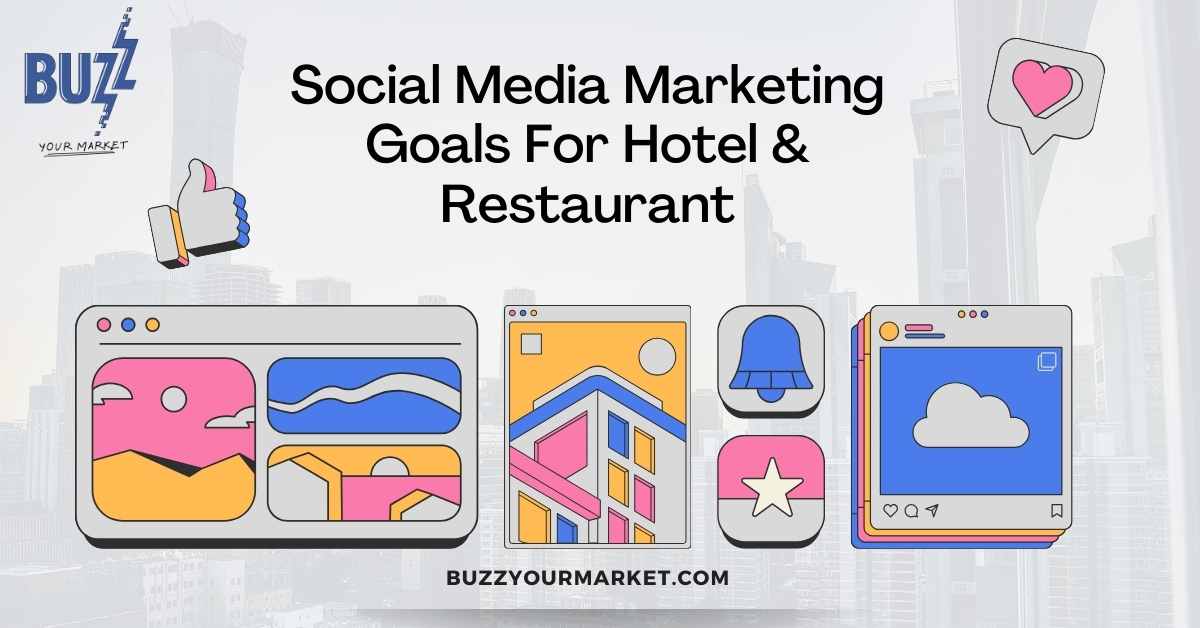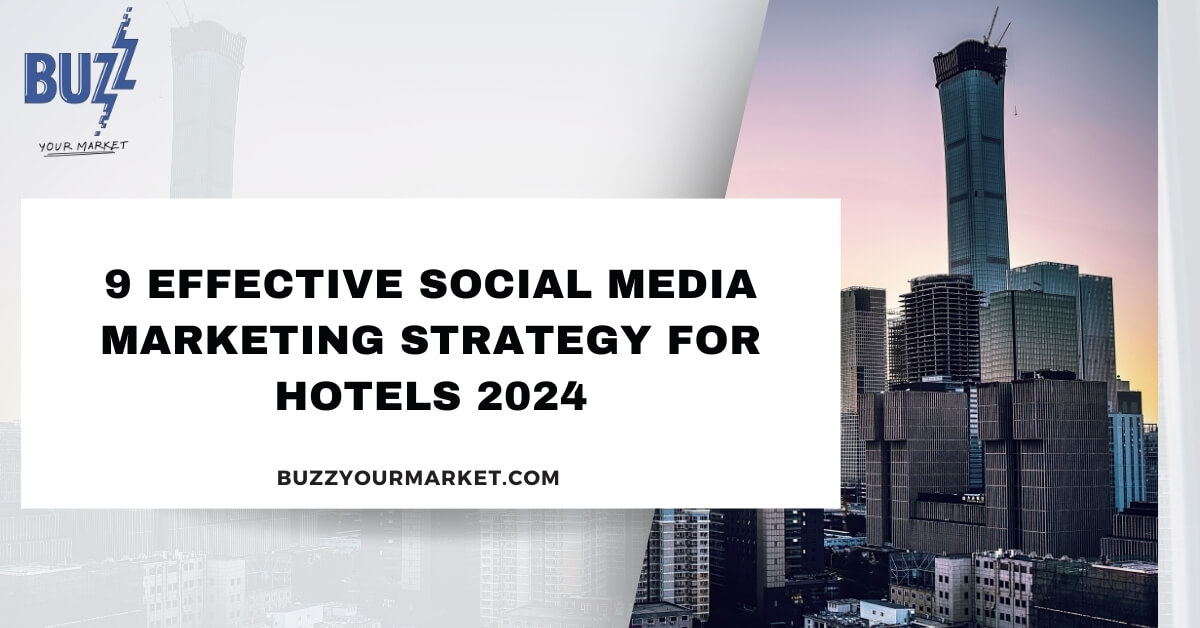9 Effective Social Media Marketing Strategy for Hotels 2024
In 2024 if you are not using social media marketing for your business, you are probably missing one of the most important elements of business.
if you are running hotels and restaurants, and want to market on social media for hotels, continue to expand as platforms evolve to audiences grow with more engaged.
With the right social media marketing strategy for hotels, your hotels can elevate their brand presence, engage directly with their target audience, and influence booking decisions.
I am going to share with you the 9 Most Effective Social Media Marketing Strategy for Hotels, marketing strategy for hotels can be offering a dynamic way to showcase hotel amenities, unique experiences, and user-generated content that resonates with potential guests.
What is a Social Media Marketing Strategy?
Identifying the Target Audience: It is crucial to understand who the guests are, including their demographics and preferences. This knowledge helps in tailoring content and campaigns that resonate with the audience.
Choosing the Right Platforms: Not all social media platforms suit every hotel. The choice depends on where the target audience spends most of their time and which platforms can best showcase the hotel’s features.
Content Creation: Developing engaging content that tells the hotel’s story, showcases amenities, and highlights unique selling points. This might include high-resolution images, videos, and user-generated content to enhance authenticity
Engagement Strategies: Active engagement with the audience through comments, messages, and posts. Real-time interaction helps in building trust and loyalty among potential customers.
Influencer Collaborations: Partnering with travel influencers to reach a broader audience. This strategy involves offering deals or experiences in exchange for exposure on the influencer’s social media channels.
Performance Analysis: Utilizing social media analytics to track the success of different strategies and content types. Key metrics to monitor include engagement rate, impressions, reach, and video retention rates.
Advertising and Promotions: Implementing targeted advertising campaigns to reach specific demographics. This includes using geo-targeted ads, special promotions, and direct booking incentives to increase conversion rates.
Social media strategy not only to grow in hotels and restaurants but also helps many businesses like event business, construction business, and more.
Define Social Media Marketing Goals For Hotels & Restaurant

Increase Brand Awareness: Amplify your hotel or restaurant’s visibility on social media platforms. This involves measuring metrics such as follower count, reach, and impressions.
Boost Guest Engagement: Focus on strategies that increase interactions on your posts, such as likes, comments, and shares. This metric helps in understanding what content resonates with your audience.
Drive Traffic to Website: Use social media posts to redirect users to your hotel or restaurant’s website to increase bookings and inquiries.
Enhance Online Reputation: Monitor and improve your establishment’s reputation by encouraging positive reviews and quickly addressing negative feedback.
Generate Direct Bookings: Set specific targets for the number of direct bookings through social media channels by utilizing targeted ads and special promotions.
Promote Events and Offers: Use social media to inform followers about special events, discounts, or exclusive offers, aiming to increase participation and bookings.
Engage Local Community: Strengthen relationships with the local community by highlighting local partnerships and community events.
Measure ROI: Implement tools to track the return on investment from social media activities, ensuring that the efforts are cost-effective and meet financial objectives.
7 Platforms Where You Can Make Social Media Marketing Strategy for Hotels
Create Your Brand’s Voice and Story that Is Shareable
It is essential to prioritize consistency and authenticity across all social media channels to effectively tell your hotel’s narrative and develop a brand voice that appeals to prospective visitors.
To make hotel social media post ideas for your hotel stand out, consider the following best practices and examples:
Develop a Unique Brand Voice: Make a tone that reflects your hotel’s brand personality and values.
Highlight Unique Features: showcase precious aspects of your hotel, such as design and local food varieties, which can encourage customers to share their experiences.
Storytelling Through Content: share your hotel’s features and benefits in compelling narratives, origin of the hotel, stories about staff, BTS, and more insights.
Consistent and Authentic Posts: you should regularly share updates about your hotel or restaurant.
Utilize Storytelling Techniques: tell your story via social media platforms like FB, Instagram, and WhatsApp to connect with your audiences.
Collaborate with local Businesses & Travel Influencers for Increased Visibility of Your Hotel
Identify the Right Influencers: find the proper travel and tour influencers who can create content targeting your audiences.
Promotional Strategies: tell them to use their platforms, such as Instagram stories, and reels, to promote their experiences at your hotel.
Content Co-creation: build a brand persona and create content with influencers that will make unique aspects of your hotel.
Local Visibility: By interacting with regional tourist boards and chambers of business, you can raise awareness of your hotel and attract more visitors.
Event Hosting: Use the areas in your hotel to hold events. Partner with outside planners and nearby companies to increase your market reach and provide exclusive offers during neighborhood celebrations.
Doing this marketing strategy for hotels, your hotel will be visible on local addresses, and many local people going to know about your hotel & restaurant.
Create Customized Packages and Exclusive Offers & Deals
Loyalty Discounts: build a natural relationship with your audiences by giving exclusive loyalty offers to encourage repeat visits.
Rich Visual Content: To draw in and maintain the curiosity of your target audience, post well-taken highlights of your accommodations, features, local activities, events, packages, and special offers.
Gain insights into your target market by researching, soliciting consumer feedback, and analyzing competitors. Then, customize your offerings to cater to their preferences, pain concerns, and spending capacities.
Choose the Right Social Platforms for Social Media Marketing Strategy for Hotels
Choosing the appropriate platforms and keeping an active presence is essential for optimizing your hotel’s social media marketing plan. Here’s how to do it in an organized way
Identify Relevant Platforms: first, identify which social media channels are most frequented by your target audiences.
Create Engaging Profiles: once the platforms are chosen, create business profiles on their platform.
Post Regularly: To engage with your fans, upload pictures, videos, and narratives consistently.
Invest in Paid Advertising on Meta
Purchasing paid advertising on Meta platforms—Facebook and Instagram, mainly—offers a focused way to connect with possible visitors. Here’s a summary of how to use your hotel marketing dollars and initiatives wisely in 2024.
Spending Allocation for PPC and Social Media Advertising: Set aside a reasonable amount of your marketing budget for social media and pay-per-click (PPC) advertising.
By utilizing these techniques, you may focus on specific keywords, user demographics, and travel preferences depending on geography, interests, and travel preferences, ensuring prospective visitors actively looking for lodging see your hotel.
Benefits of Metasearch Advertising: Investing in metasearch advertising may be quite profitable, with a 20:1 ROI. This tactic puts your hotel on sites where prospective customers may compare rates and features, which enhances visibility and direct reservations.
Performance monitoring: Keep an eye on the success of your advertising campaigns at all times by using tools such as Google Analytics. Making wise modifications to enhance outcomes and maximize expenditure is made easier with the use of this data.
Staying Competitive: To make sure your tactics stay successful and your hotel stands out in a crowded market, stay up to date on the most recent developments in hotel SEO, content marketing, and advertising platforms.
The cost-effectiveness of meta advertising is an advantage offered by meta platforms. Establishing a company page is complimentary, and although sponsored ads are not required, they provide a noteworthy return on investment by connecting with a sizable and specific audience.
Social Media Booking Integration & Define Your Hotel’s Brand With Unique Selling Points
Eco-Friendly Initiatives: Promoting ecologically friendly behaviors can draw tourists who care about the environment.
Culinary Excellence: To entice foodies, highlight special delicacies, on-site dining experiences, or well-known chefs.
Architectural Uniqueness: Make your hotel a destination by showcasing unique architectural elements or historical importance.
Tailored Guest Experiences: Provide individualized services or packages that address particular interests such as wellness, exploration, or regional customs.
Technological Innovations: To attract tech-savvy visitors, highlight features like smartphone check-in, smart rooms, or customized mobile applications.
You may improve your web presence, draw in more visitors, and eventually increase bookings by integrating social media booking systems and outlining and publicizing your hotel’s unique selling qualities.
Engage with your Followers to Build Community

Quick Reaction to Direct Messages and Comments: Reply immediately to direct messages and comments. This Demonstrates your appreciation for client input and your awareness of their demands.
Promotion of User-Generated Content (UGC): Invite visitors to share their experiences and images with a specific hashtag. Put this stuff on your profiles to thank them for their effort and to foster a sense of community.
Live Sessions and Q&A: Host live sessions on platforms like Instagram and Facebook to discuss upcoming events, offer behind-the-scenes looks, or conduct Q&A sessions. This real-time interaction significantly boosts engagement
Exclusive Social Media Groups: Create private groups for your past and frequent guests. Offer them exclusive content, early-bird specials, and a platform to connect, enhancing loyalty and repeat business
By applying these tactics, social media and hotels may successfully establish and sustain a strong online community, resulting in greater guest loyalty and brand reputation.
Guest Testimonials, and Reviews to Enhance Your Hotel’s Online Reputation

Encourage Guest Reviews: Make it easy for guests to leave reviews by sending follow-up emails after their stay and directly providing links to review platforms.
Respond to Reviews: Show that you value guest feedback by responding promptly to positive and negative reviews. This interaction demonstrates good customer service and can mitigate the impact of less favorable reviews.
Highlight Positive Testimonials: Feature glowing testimonials prominently on your website and social media. This can include quotes from reviews or user-generated content that showcases guest experiences.
Monitor Online Reputation: Regularly check your hotel’s status on review sites and social media to gauge public perception and address any issues promptly. Tools like Google Alerts can automate this process, informing you of what’s being said about your hotel online.
Take Action From Comments Ask for Reviews
Promptly Encourage Reviews: Immediately after a guest’s stay, send personalized emails or messages thanking them for their visit and inviting them to leave a review. This timely communication can significantly increase the likelihood of guests providing feedback.
Make Reviewing Easy: Include links to your hotel’s review page on platforms like TripAdvisor, Google, and Yelp in post-stay communications. Simplifying the review process encourages more guests to participate.
Respond to All Reviews: Show appreciation for positive reviews with a thank you message and address any negative feedback promptly and professionally. This demonstrates your commitment to guest satisfaction and can often convert a negative experience into a positive one.
Offer Incentives for Reviews: Consider offering a small incentive, like a discount on future bookings or a special service during their next stay, to encourage guests to leave a review. Ensure that this is done in a way that complies with the guidelines of the review platforms.
Monitor Review Trends: Regularly analyze the feedback from reviews to identify areas for improvement and better understand guest needs. This insight can be crucial for refining your service offerings and enhancing the overall guest experience.
Engage the Audience by Posting Reels/Short-form Videos
Quick and Engaging Content: Use the 15-60-second format to convey the core of your hotel’s ambiance and offerings. This structure is excellent for today’s fast-paced social media climate when people want rapid and entertaining information.
Platform-Specific Strategies: While Instagram Reels provides user-friendly features like filters and text overlays, TikTok’s algorithm delivers content to a specific audience. Choose the platform that best matches your content and where your target audience is most engaged.
Videos provide a more personal and creative narrative style. Highlight your hotel’s distinctive features, from exquisite facilities to special behind-the-scenes excursions, to make it relatable and appealing.
Diverse Content Creation: Post various content, from guest testimonials to mini-tours of your locality. This diversity keeps your audience interested and engaged, giving them a rich perspective of what to expect.
Optimal Posting Strategies: For maximum engagement, post during peak times identified through platform analytics and maintain a consistent posting schedule to keep your audience looking forward to more content.
By integrating these hotel social media post ideas and strategies, hotels can effectively use short-form video content to connect with potential guests, enhance online visibility, and drive engagement, ultimately influencing booking decisions.
Learn from your Competitors
Implement Competitive Analysis Tools
Utilize your social media: Using tools like Buzzsumo or Hootsuite Insight can help you analyze your competitors.
SEO Competitive Analysis: Use some SEO tools to Analyze what keywords are trending on their platform.
Analyze Competitor Strategies
Benchmarking Social Media Performance: BE consistent and analyze your competitors’s social media profiles and make a content strategy
Identify Gaps in their Strategies: By observing where your competitors may be lacking, you have opportunities for your hotel to stand out.
Learn from Customer Feedback on Competitor Channels
Monitor Customer Reviews and Feedback: Regularly check your customer reviews and feedback, such as TripAdvisor and Google reviews, which can help you know what your customers like and dislike about your hotel.
Adopt Best Practices: Ensure you implement best practices by stealing your leading competitor’s social media profiles.
Conclusion
Navigating the evolving social media marketing strategy for hotels in 2024 offers exciting potential and complex problems. Hotels may significantly increase their digital presence and visitor engagement by implementing the tactics presented, ranging from harnessing visual storytelling’s power across many platforms to beginning engaging, community-focused events.
Each hotel’s social media marketing method, precisely developed to improve a hotel’s online presence, emphasizes the necessity of a nuanced understanding of one’s audience, the creative exploitation of unique selling features, and the strategic integration of technology to encourage direct reservations and improved guest experiences.
In a day where the digital front is becoming increasingly crucial to a hotel’s business, understanding the art of social media marketing is more important.

